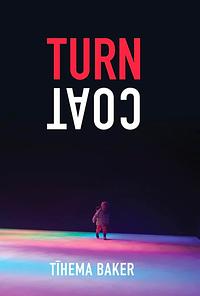Take a photo of a barcode or cover
challenging
hopeful
informative
inspiring
reflective
medium-paced
Plot or Character Driven:
A mix
Strong character development:
Yes
Loveable characters:
Complicated
Diverse cast of characters:
Yes
Flaws of characters a main focus:
Yes
Leveraging a sci fi telling of aliens colonising the earth was an unexpectedly effective way of building empathy for the Māori experience of colonisation in NZ. A compelling, engaging read.
This book is the perfect complement to more academic readings on colonisation and decolonisation. It helps you to move beyond an intellectual understanding of these topics.
This book is the perfect complement to more academic readings on colonisation and decolonisation. It helps you to move beyond an intellectual understanding of these topics.
reflective
medium-paced
Plot or Character Driven:
A mix
Strong character development:
Yes
Loveable characters:
Yes
Diverse cast of characters:
Yes
informative
reflective
medium-paced
Plot or Character Driven:
Character
Strong character development:
No
Loveable characters:
Complicated
Diverse cast of characters:
Yes
Flaws of characters a main focus:
Complicated
emotional
funny
inspiring
reflective
sad
fast-paced
Plot or Character Driven:
A mix
Strong character development:
Yes
Loveable characters:
Yes
Diverse cast of characters:
Yes
Flaws of characters a main focus:
No
challenging
funny
reflective
medium-paced
Plot or Character Driven:
A mix
Strong character development:
Yes
Loveable characters:
Complicated
challenging
dark
emotional
reflective
slow-paced
Plot or Character Driven:
A mix
Strong character development:
Yes
Diverse cast of characters:
Complicated
Flaws of characters a main focus:
Yes
The "alien colonisation of Earth as a metaphor for colonisation within Earth" subgenre is far from new. There are still excellent works being published in this space (Clare G. Coleman springs to mind). Tīhema Bakers _Turncoat_, though, manages to explore it in a way I haven't really seen before.
It's the story of a young, idealistic human who decides to change the situation for his people by working within the system (if you feel like the two survivors in a horror movie have just decided to split up, then yup). I understand it's heavily based on the author's own experience. It's very clever and at times very funny - I think I actually yelped at the projection of New Zealand's most iconic symbol. And at the same time, it's underscored by not just a profound sense of loss, but the sense that its human characters and societies have lost even the ability to comprehend that loss, or to know what they have lost (has been taken from them, to be more accurate). You realise the parts that are so wonderfully funny are only so because they are misunderstandings or ideas divorced from their context. Because so much has been taken from the humans of the story.
There are parts that are brutal and actually quite harrowing. Physical violence, deprivation of the necessities of life, absolutely feature, as do the repeated blows of having your name mispronounced. But it also makes you stop and imagine: in a world where things like road-trips, chips, rick-rolling, all sit in isolation as half understood concepts, and everything that might connect them is gone and you don't even know what should be there, how do you even process that devastation?
Turncoat is unsubtle because it needs to be. While the first part was, as I've said, clever, I don't feel it came into its own as a novel until maybe 2/3 of the way through. What happens to those closest to Daniel, and how he deals with it, takes it up separate notches. There are no easy answers or solutions. This might be a novel about someone trying to find a solution, but it ends up being one about how the problem runs deeper, and across more areas of life and ways of being, than most are prepared to acknowledge.
It's the story of a young, idealistic human who decides to change the situation for his people by working within the system (if you feel like the two survivors in a horror movie have just decided to split up, then yup). I understand it's heavily based on the author's own experience. It's very clever and at times very funny - I think I actually yelped at the projection of New Zealand's most iconic symbol. And at the same time, it's underscored by not just a profound sense of loss, but the sense that its human characters and societies have lost even the ability to comprehend that loss, or to know what they have lost (has been taken from them, to be more accurate). You realise the parts that are so wonderfully funny are only so because they are misunderstandings or ideas divorced from their context. Because so much has been taken from the humans of the story.
There are parts that are brutal and actually quite harrowing. Physical violence, deprivation of the necessities of life, absolutely feature, as do the repeated blows of having your name mispronounced. But it also makes you stop and imagine: in a world where things like road-trips, chips, rick-rolling, all sit in isolation as half understood concepts, and everything that might connect them is gone and you don't even know what should be there, how do you even process that devastation?
Turncoat is unsubtle because it needs to be. While the first part was, as I've said, clever, I don't feel it came into its own as a novel until maybe 2/3 of the way through. What happens to those closest to Daniel, and how he deals with it, takes it up separate notches. There are no easy answers or solutions. This might be a novel about someone trying to find a solution, but it ends up being one about how the problem runs deeper, and across more areas of life and ways of being, than most are prepared to acknowledge.
emotional
informative
reflective
sad
tense
fast-paced
Plot or Character Driven:
Character
Strong character development:
Yes
Loveable characters:
Yes
Diverse cast of characters:
Yes
Flaws of characters a main focus:
No
challenging
emotional
reflective
medium-paced
Plot or Character Driven:
A mix
Strong character development:
Yes
Loveable characters:
Yes
Diverse cast of characters:
Yes
Flaws of characters a main focus:
Complicated
Turncoat is a work of science fiction set on a near future earth that has been colonised by aliens. Daniel is a young idealistic Human who takes a position working for the Alien government in order to get a fair deal for his people and specifically to have the terms of a treaty between the Hierach (Alien government) and Human society honoured. This was a brilliant way to explore contemporary race relations in Aotearoa New Zealand and to portray the reality faced by many Māori public servants operating in two different and conflicting worlds. Sadly, I fear life for them will be more challenging, the gap between the terms of Te Tiriti o Waitangi and its implementation ever wider, thanks to our new coalition government. Brilliant satire and parody, not at all subtle - an exploration of alienation via aliens - but to me it didn’t feel too heavy handed either. As I read I found myself alternately nodding sadly, chuckling wryly, or seething as I recognised various truths about Aotearoa reflected back to me via Baker’s unique lens - that of Māori public servant whose real life experiences inspired this novel. I’m unsure how readers unfamiliar with Aotearoa’s history and contemporary social and political environment will find this book. But I’d love to press it into the hands of all Kiwi readers, have it taught in schools here - and make it required reading for politicians across the board.
Graphic: Racism, Police brutality, Colonisation
medium-paced
Plot or Character Driven:
A mix
Strong character development:
No
Loveable characters:
No
Diverse cast of characters:
Complicated
Flaws of characters a main focus:
Complicated
I really wanted to love this book more than I actually did. I feel like Daniel’s character and self-awareness could have been developed to also tackle the privilege of being white and Indigenous. Felt a bit flat.
The metaphor was also too heavy handed and it may have been better as a non-fiction critique/essay without the fictional mask.
The metaphor was also too heavy handed and it may have been better as a non-fiction critique/essay without the fictional mask.
challenging
funny
reflective
medium-paced
Plot or Character Driven:
A mix
Strong character development:
Yes
Loveable characters:
Yes




